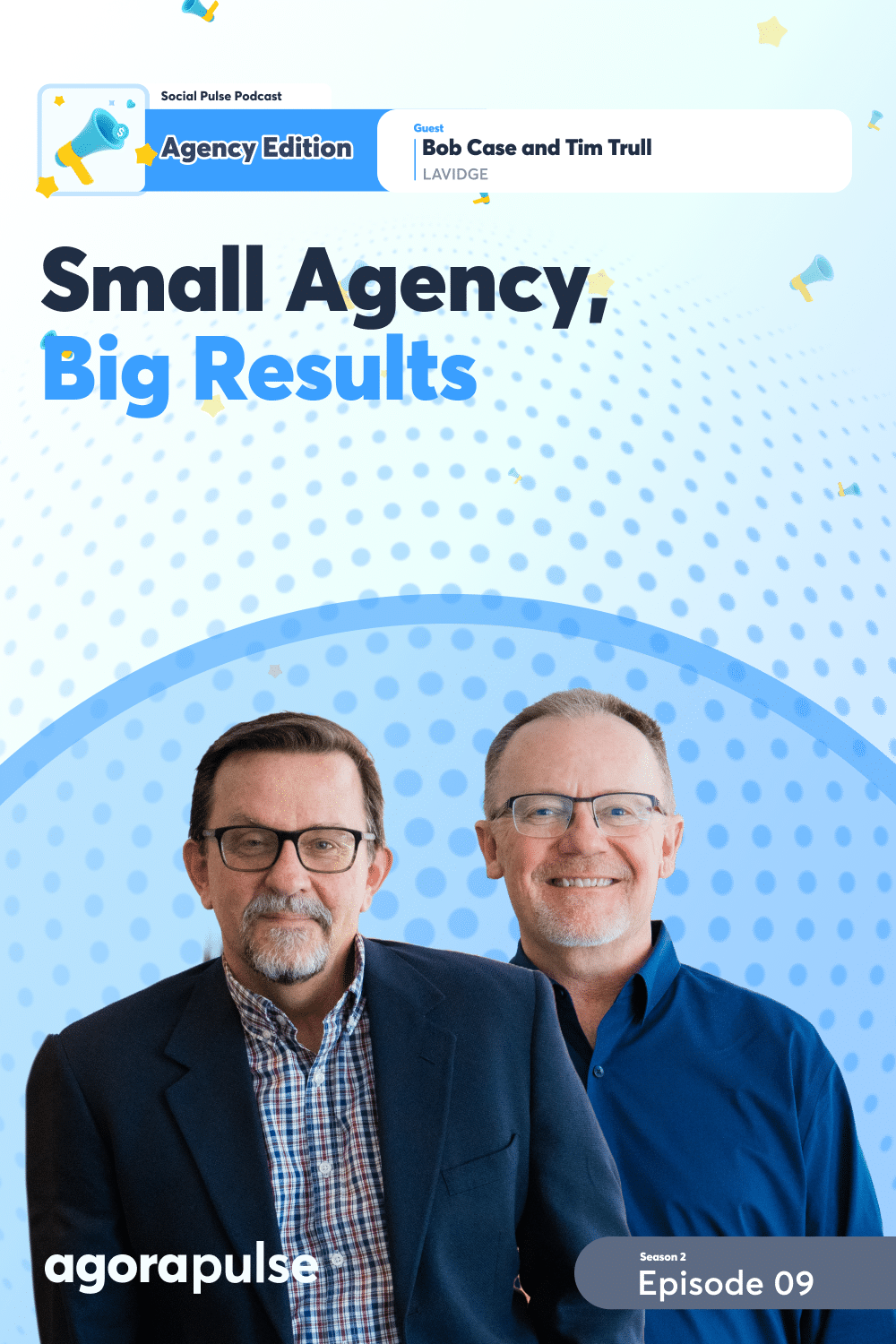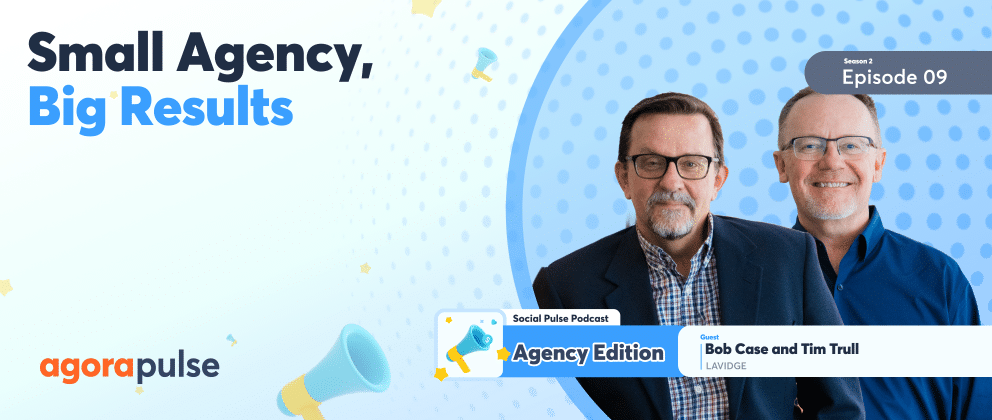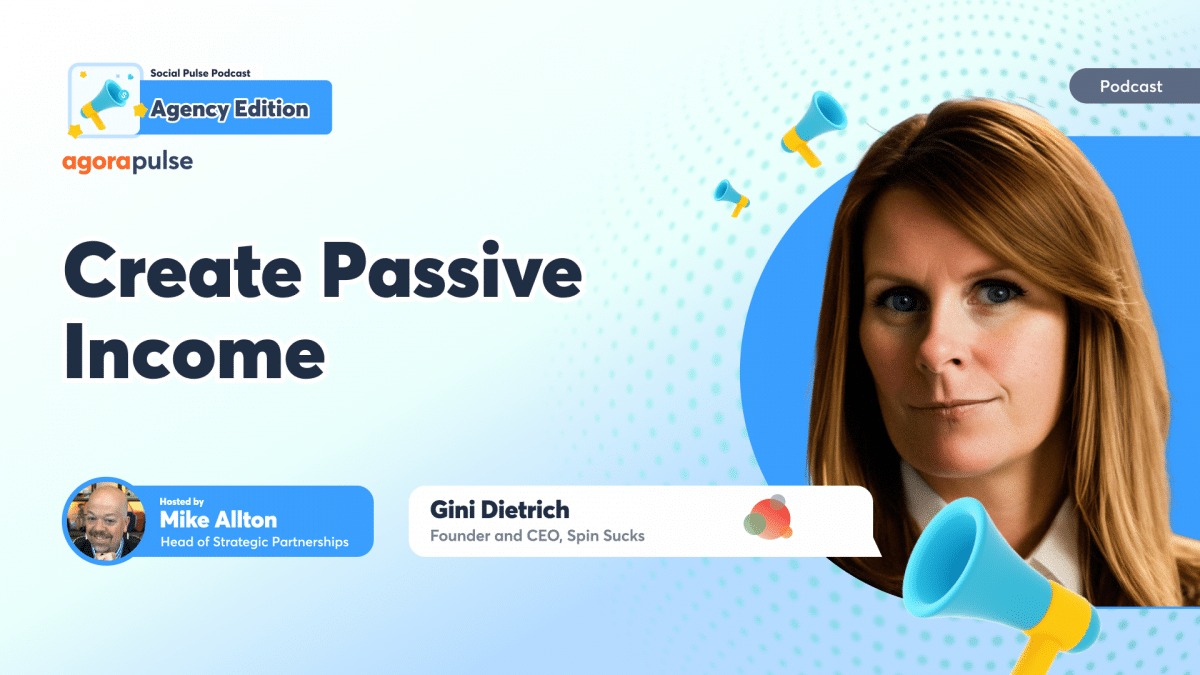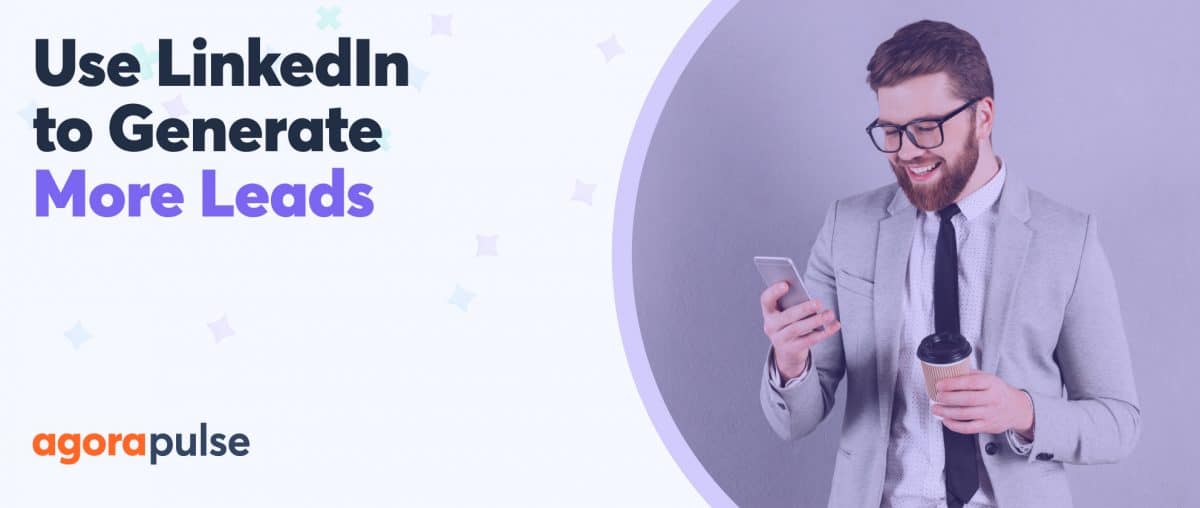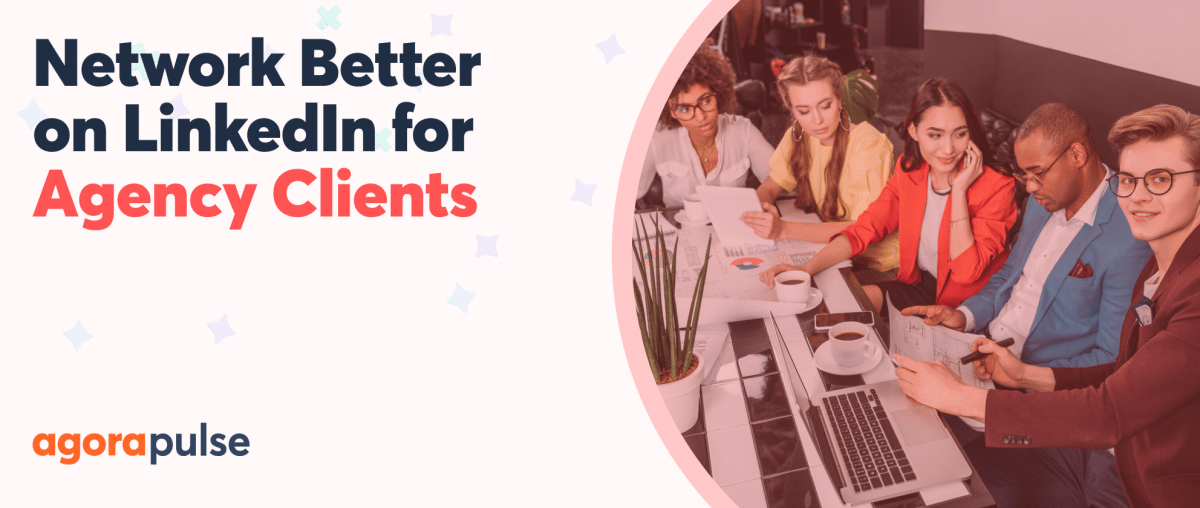Competing with big national agencies is tough, especially when you’re smaller, maybe a regional player. But what if the secret to success lies in engaging with clients early and offering specialized services?
Agorapulse’s Chief Storyteller Mike Allton sits down with Bob Case and Tim Trull from Lavidge, an agency that’s made waves by turning small beginnings into big wins. Bob, the chief creative officer and co-president, has been with Lavidge since 2000 and was named the first creative director of the Year by the Phoenix Ad Club. Tim, the chief strategy officer, brings over 30 years of experience to the table, crafting strategic plans that have propelled agency clients to national prominence.
Bob and Tim will share how early engagement and specialization have become their competitive edge. They’ll dive into strategies, success stories, and the lessons they have learned along the way.
If you’re running a smaller agency and wondering how to stand out, this episode is for you.
[Listen to the full episode below, or get the highlights of the Social Pulse: Agency Edition, powered by Agorapulse. Try it for free today.]
Challenges of Being a Smaller Agency
Mike Allton: If you could just start off by giving us an overview of your agency and some of the challenges that you’ve maybe faced as a small or regional agency competing with larger national agencies.
Tim Trull: Lavidge is an integrated marketing and communications agency. We’re located in Phoenix, and we’ve been here for probably about 40 years. So we’ve got some really good longevity in the market. I’ve got about 70 people that work for us, and in Arizona terms, that’s a large agency. In national terms, that’s a not-so-large agency. On top of that, we are an ESOP, so we’re an employee-owned agency, the first employee-owned agency in Arizona, which is pretty cool.
Bob Case: As [Tim] does it pretty well, the agency itself has represented everything from pro sports teams to universities within the state of Arizona. We have had some national clients as well.
When we talk about the challenges of being a smaller firm in an outlier market, we’ve faced a lot of these things where you’re trying to be relevant in conversations that just aren’t normally where we sit.
What are some of those specific challenges, or what does that look like, not being a part of that conversation?
Bob Case: We’ve done work with national clients like Massage Envy. We’ve been one of the regional agencies for McDonald’s in the past. And when you’re trying to compete against national agencies, and they’re starting to aim a little bit down from where they’ve been in the past—just because competition is what it is, the spends are getting tighter, all of that stuff—you look at how all of this stuff kind of compresses.
For us, reputationally, we’re great. We’re very good at what we do. We’re well thought of in Arizona, but we’re in Arizona. And so when you’re trying to go out and compete against national agencies who just have—and this goes to what we do for a living, right? Brand awareness is brand awareness, and the bigger agencies with the PR that they put behind it are where they sit. So for us, we like the position of kind of being the underdogs when we go up against those teams and those kinds of groups.
And so that’s the challenge, right? That’s the rub of this stuff. That’s where this stuff gets hard: “How do you differentiate? How do you bring value? When you’re in the room and you’re competing against those guys, what can you do to put yourself forward?”
Tim Trull: Mike, one of the things that I think it is, for us, we’re no different than any other agency that’s in what’s called a smaller advertising market.
Even though Phoenix is a very large market, it’s not necessarily seen as a large advertising market. So what happens is that we’re like the Rodney Dangerfield of advertising. You know, we don’t get the respect that we demand.
And there are some incredible talents here in Phoenix. There are some incredible agencies here in Phoenix, but it seems like a lot of times some of the national brands will skip over Phoenix and go to LA because of proximity because of the large market there. And because, as Bob said, the name recognition of one of the larger agencies, sometimes there’s a cache associated with that.
Don’t miss out on brand new episodes of Social Pulse: Agency Edition.
Do You Really Need Early Engagement?
Mike Allton: So I’m wondering how important early engagement is, as we kind of touched on that for a brief moment in the introduction.
I’m wondering how that happens and how that occurs with your clients, how that impacts your strategy, and what that process looks like for your agency.
Tim Trull: It’s really important for early engagement. So oftentimes, what we find is that if we’re working with clients that are a growth client—maybe one that’s kind of on an upper trajectory—oftentimes they will come to us, and we will be working with either a very small marketing team or maybe no marketing team, and we’ll have really direct access to a C suite.
Early engagement is important to build a relationship with the C suite because, as they grow, then all of a sudden that relationship is already there. But as they actually get to the point to where they grow, and they even come to a point where they outgrow us, then some of those folks that are in the C suite will tend to go off to other companies, run other companies—which then that relationship has turned into an annuity for us where it does continue to move us forward and to allow us to have access into other pieces of business in the future.
The relationship-building part is super-important on the front end, and they’re very needy. Sometimes, if it’s a smaller company—even if it’s a larger company—we’re coming in at a point to help solve a problem.
And so what we’re doing is we’re helping people by solving those problems and building those relationships so that they have the trust that we can do the job for them and, in turn, be able to grow that business into something bigger.
Targeting Businesses in Growth
Do you guys target businesses that are in a growth stage? Do you know that they’re going to grow to a certain point? And whether you do or not, could you share an example of a client that you’ve worked with at that early stage and how that relationship evolved?
Bob Case: The first example that I could bring up would be Massage Envy.
When we started working with them, this would have been back in 2008, something like that, maybe a little bit earlier than that, they had 130 locations in the United States, so they were not a very big franchise organization. They had just gotten to the size that having a true advertising partner was going to help them. So when we went in and we started working with them, it was really about getting in and doing some education for them … It’s fun. And as you had said, awareness equals preference. So it’s as simple as that. If you want to take it down to it, it’s just most kind of granular point.
But as we got into this with Massage Envy, the fun that we were having with them was coming into it in the moment that we did it.
Think about this back then. The massage industry had a lot of negative connotations. It was still a massage parlor. It was all of those things. So what we ended up taking with them was a really kind of nuanced look at [the industry].
There were three different phases that we were going to talk to them about, which were establishing credibility, overcoming obstacles, and then making it part of your life.
And so this wasn’t just a campaign of awareness. This was us helping them understand where they sat within what consumers were thinking about their industry, then talking to them about how they could position themselves now and then over time. So this ended up being a five-year conversation. I think we ended up working with them for 10 or 12, but it was a cool way to get in and start early.
And this is, again, the conversations and the relationships and just being honest with people, ’cause it’s fun to go in and do this, but it’s also awkward when you have to go in at the very beginning of a project and your industry is viewed as kind of a little bit shady. And in order for us to help you and to move this thing forward, we’re going to need to do these intermediate steps to kind of get us to where we want to get to.
Are there some specific specializations that you’ve gone into that you think kind of sets you apart or do you guys just do everything?
Tim Trull: One of the things that we have tried to do is rather than position ourselves around service offerings because those can be commoditized pretty easily. We’ve really tried to angle into more solution-based sort of offerings.
- Bob brought up a good example of Massage Envy and, from a solution standpoint, how do we help clients grow to the next level? Massage Envy is a perfect example. We took it on as 137 locations. It grew over the 10 years up to over 1,100 locations worldwide, a billion-dollar company, so hockey stick growth on that. So that’s one solution. You can also look at solutions to help the companies transform themselves.
- Some more B2B type of examples: United Rentals. They’re the largest equipment rental company in the world. They were historically a sales-driven organization. When we started working with them, a very small marketing department in one of their acquisition partners, we helped them to become more of a marketing-oriented organization.
- Same thing with Republic Services. They’re the waste disposal company. When we started working with them, they had one marketing person for a $4 billion company. So those kinds of things that are leaning into more solution-based offerings where then all the services just flow underneath that, that’s a stronger position for us to go in and sell on.
Mike Allton: For some of these solutions, did you go into them knowing, “This is the solution that we want to provide for this category of client,” or did it kind of develop and you realize in retrospect, “Oh, that’s a solution that we can provide because we did it for this client, now we’re going to turn around and provide it to others.”?
Is that how those developed, or was it intentional?
Tim Trull: No, I think that’s exactly how those develop because of what happens. And that’s the great thing about being able to have a lot of those experiences—that all of a sudden now you have expertise. Now, you have expertise with its transforming companies, United Rentals, we have the expertise of being able to transform them to sales-driven versus marketing-oriented. With Republic Services, the same thing.
Now what we can do is we can come out, and we identify similar kinds of companies that are sales-driven organizations that are really heavy into M&A. How can we help you to be more of a marketing-driven organization? So a lot of times the experience leads to the expertise on the tail end of it.
Bob Case: And a tangent off of that would go into the relationships that you develop while you’re doing it.
Massage Envy, as an example, had two or three different CEOs. We saw them through at least four or five different purchases. And as people would leave, so we had a couple of CEOs that were there that had moved on to other companies, and so what you wind up with is by proving that you can do this thing and do this thing well, as we always call everybody’s a leverage alumni if they ever leave wherever they are. They’ll end up pulling us through. So that becomes a really good new business strategy as well.
Mike Allton: Takeaways already that I’m hearing from you guys:
- Target initially smaller clients, hopefully in a growth mode where it’s going to be easier for you to get with them.
- Start to develop the expertise as you develop success and the kinds of solutions that you can provide.
- Focus on marketing, not specific services.
Yeah, you could say, “I do Facebook ads,” but so do a thousand other agencies. They all do Facebook ads. If you can talk about the actual solution, it’s just Marketing 101, right? Benefits over features. That’s what you should absolutely lean into, folks.
Mike Allton: So we’re targeting initially smaller brands, emerging brands, right? We’re trying to help them get into a growth mode with our solutions.
How do you position your agency so that you can not only ensure long-term growth, but you can also ensure the retention of that client because it all goes to naught if they turn around and leave you for one of those larger agencies? How do you figure that out?
Tim Trull: So, just one thing off of the targeting of smaller, that’s one aspect of it. Certainly, that doesn’t mean necessarily that we aren’t looking at finding project work within larger companies as well.
But in helping those organizations that are growing, we need to meet them where they’re at and where their demands are. I mean, because if you think about it, I think I said earlier that oftentimes what we’re doing is we’re working with some of those growing companies, either the CEO, the owner, the founder, and maybe a very, very small marketing team at the very beginning.
So at the get-go, they’re looking for a kind of expertise, even outside of what an agency provides. They’re looking for more consulting; they want you to help them to kind of navigate the waters of how they grow. How do they hire in a marketing department? How do they even plan and media plan? So a lot of it is providing them with expertise, almost like a consultant.
Also being able to grow with them from a service standpoint because initially they just may need a corporate identity, but then from that, they’re going to need an awful lot of other things, so having an organization that can scale with them throughout that process and even from that, just to build kind of a strategic foundation for how they grow. Bob was talking about Massage Envy, and some of the different steps that we went through when we first started working with them. Our strategy and platform were professional, convenient, and affordable.
And so that’s really what we based everything on: that you can come in, and it wasn’t like the seedy organizations and massage partners of the past, this is professional. Convenient means that they’ve got multiple locations and affordable means it also wasn’t the expensive resort massage that you would get. So I think that part of the thing is that there’s a lot of need for some of these organizations that are in growth mode, so you need to meet them where they’re at and be able to grow with them over time.
Self-Awareness
I’m wondering if you could share what role you think self-awareness might play in your approach to building and maintaining client relationships.
Bob Case: Absolutely. I feel like you have to know your truth. You have to know who you are and why you exist. And when you have to try and go in and reinvent yourself to be something that you’re not.
You’re asking a client to pay for you to do that in the meantime, and that’s just not efficient. As we’ve been looking at the industry itself and where things are going, we’re truly finding that our value is in trying to be at the strategic end of this business and to be as smart as we can be. So we’re doing everything that we can just to understand consumer behavior and what they’re looking for so that when we pull that in and we apply that to your business, we’re speaking for this audience that we know well, and now we know that we can be effective in the work that we’re doing for you.
I think agencies for a long time, especially smaller agencies, have crossed so far over into the marketing side of it and just created tools that waiting for those assignments and doing those was something that was profitable and could play out.
But with the advent of automation, where AI is going, a lot of these other things, a lot of that stuff is going to start to fall back off. A lot of that’s being pulled back in-house.
“Be self-aware, know where your strengths are, and know what you’re good at.”
Mike Allton: I know a lot of the agencies that are listening—they’ve had two major factors working against them in recent years.
- First, there was the pandemic, and then a year and a half later, we were basically [in] a recession mode. So a lot of businesses were cutting marketing budgets, which meant a lot of agencies were churning those clients.
- And then the other issue that I think faces a lot of smaller agencies in particular, which I think parallels exactly that with the comment you were just making, Bob: “If I’m just starting my agency, I’m typically going to accept whatever work I could possibly find. If it’s even remotely in my skill set, I’m going to say, ‘Yes, I can do that job.’ And I’m going to give you a low-ball budget project bid to get that work because I need the income and I completely understand that.” But that often leads to increased churn where you’ve got clients where they weren’t a good fit from the beginning. You just accepted it for the paycheck. I know you guys have probably never lost a client in your entire career, right?
The Good and Bad Client Relationships
How do you handle those kinds of situations, particularly when we’re talking about clients where maybe you were with them early on and develop those relationships?
You were working directly with the C suite from day zero, and they decided they wanted to go on to a larger agency or maybe an in-house team. I don’t know if there’s a specific experience you could share, but I’m just kind of wondering how that’s been dealt with from your perspective.
Tim Trull: I think a part of that is, too, if you’ve got a good relationship with your clients, then hopefully you’re having those honest conversations in advance. And you’ve established kind of that trust that you can talk about that, and it’s not coming at you as a surprise that you know that there’s good reason why they would be moving on for whatever reason that is.
So I think that as long as you have that, that’s a really good starting point.
- An example of one that comes to mind for me (that actually didn’t fully go away), but they went out to a larger agency is United Rentals. And I’d mentioned that they’re a large largest equipment rental company in the world. And when we first started working with United Rentals, we actually worked with a company that they acquired.
- It was RSC Equipment Rentals. And we worked with [them and] had a great relationship with the marketing team there; United came in and acquired them. (That’s typically the kiss of death for the agency.) Fortunately, we went in and pitched the business and got the entire piece of business. As United Rentals continued to grow, to be more marketing savvy, and to elevate their gaze. They came in with a new CMO—which again is the second kiss of death for the agency—came in and said, “You know what? I want to get a large national agency on board to be able to do our campaign work.” So they went out and hired Droga5 out of New York. We were actually in the pitch. It was us, Droga5, and I think Mullin. So, which one of these is not like the other ones?
The good news about that is that even though Droga won that business for the campaign, the good news is that we continue on with a great relationship with the client, and we continue to do the kind of project work that they didn’t want to lose the knowledge base that we had with them, or that expertise that we already had built up with them, or the relationships we still have with them internally. They didn’t want to lose that, so we still continue with work while some of the other agencies may be doing some of the big campaign work, which we would love to be doing more of that. But you know what? We’ve again the self-awareness; we know our places, we know where we fit well with them, but it happens the way it is, Mike. That’s the business
Bob Case: As a creative, that stuff burns you because you can do the work, but reputationally it’s Droga.
For the CMO, you look at some of this stuff, too, and you just have to set your pride aside. Is it risk management? This is a CMO of a $4 billion company coming in, and he has to be successful. He has to get what he has to get. He has to present in front of the board. So going in with Droga, I totally understand it.
Tim talks about this from the external perspective. I also look at it from the internal perspective and the culture piece of this, which is for us and our staff to not have these things just be devastating losses and feel like you’ll never be able to do this again or whatever. We’ve turned it into a celebration at times. Like, if somebody gets to the point where they want to go hire Droga, then gather around, you guys did a really great job. We did everything that we could possibly do and we know we can continue to do it. This is a decision that they made. Yay, be proud.
And so that’s the thing that we’re trying to build is to have the resilience and a little bit of pride in the fact that we can grow these things, and we can do it. And if they stay with us, fantastic, and if they don’t, do not lose hope. This is okay.
I think that’s important, especially since, like we said, we feel like you can do great work in Phoenix. There’s talented people here. And so rising tides lift all ships, so we’re just happy to see the community continue to grow. As this happens, more and more of us are starting to get bigger chunks of these pieces of business, and then hopefully that starts to elevate us a little bit more into the conversation.
Mike Allton: That’s a terrific philosophy. We have, funny enough, the exact same approach to employees at Agorapulse. Our CEO and founder will say often, “This is not going to be your last job” for 99 percent of the people who work for Agorapulse. “And we hope that you have a great, productive time here. You learn, and then you move on and do something even better. We’re just part of your journey as you’re going on.”
I’ve never heard that approach taken to clients, and I love it. That’s cool.
Measuring Impact
Mike Allton: I’m wondering how measuring the impact of your work happens. How important is that?
How do you currently measure the business impact—particularly when it comes to engagement and some of those fuzzier metrics on social media?
Tim Trull: The marketing metrics are important, obviously. I mean, we need to know what your awareness is.
- Understanding, perception, engagement, return on ads spend, and all those things from a marketing standpoint are very important.
- But what we try to do is try to tie those back to what the business metrics are.
I talked about the transparency piece of it. We need to have those conversations upfront on what you want from your business and how we tie our marketing metrics to helping you achieve your business goals.
So it is less about the marketing metrics and more about the business goals.
- So if it is a Massage Envy, it’s how many new memberships, how many retained memberships? How many gift card sales do we have? Some of those metrics that are meaningful to them as an organization or if it’s a United Rentals, [are] a time on rent, it’s a share of wallet, some of those other things—so if we can tie our marketing metrics to their business metrics then that’s a bigger conversation.
I think that’s born out of if we are working early on with some of the owners, some of the CEOs, some of the leadership, then we have a little more access into and a little more influence over some of those business metrics.
It allows us to have those big conversations early so that then we can continue to keep that train rolling for a number of years rather than just coming in for a couple of years like most agencies, and then you’re out.
Advice for Your Smaller Agency
I’m wondering if you could finally just share any advice that you’d like to give to small or regional agencies that are kind of looking to compete. Like we’ve been talking about this entire show with some of these larger agencies.
Bob Case: I think it goes back to being true to yourself, and that’s to figure out the work that you’re good at doing—the work that brings you the greatest happiness internally and also serves the business.
Like, I’ve been around long enough that as much fun as I have being a creative and just wanting to throw everything else out the window, we’re responsible as a company. We’re extremely well financially run. So keeping that balance and not forgetting that if your goal is to be around for 20/30/40 years, the business has to survive.
So, it’s finding the mix between creativity in business and making sure that you’re doing that. Looking at your client mix and saying, “Okay, what value are we bringing? And can we feel good that when we receive the cheque from the client we’ve done our job?”
And I always boil it down to two things: Protect your reputation and your results.
Those are the two ways that you stay in business. If you enhance your reputation and if you get good client results, you’re going to be around.
Tim Trull: The only other thing was—we’ve talked an awful lot about it during this time—is the relationship piece of it.
“Part of our vision really as an organization is to do good work by making connections.
And so those connections can be not only with your client but also making connections with your internal team, with your partners, and with the community.”
We’re in the relationship business, and it should be about establishing those relationships because that’s what’s going to get you through.
Thank you for reading this episode of Social Pulse Podcast Agency Edition on Apple, powered by Agorapulse, where each and every week we’re talking to marketing agencies like you going through many of the same struggles you’re going through and sharing their stories, subscribe to find in each episode, inspiration, motivation, and the perspiration that go into growing and scaling agencies like yours. Then leave us a review. We’d love to know what you think.
Until next time!
